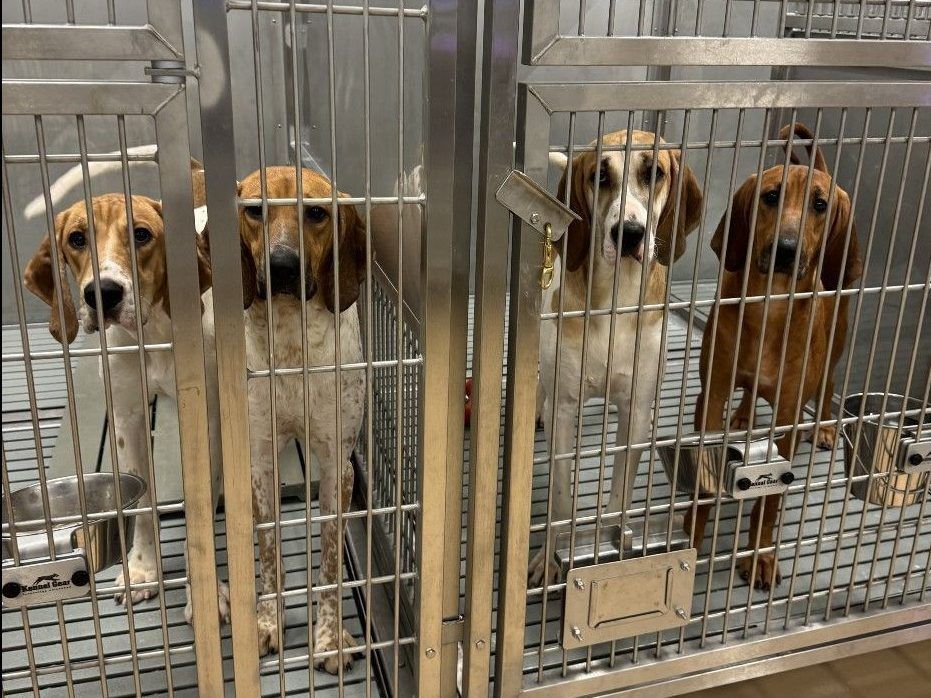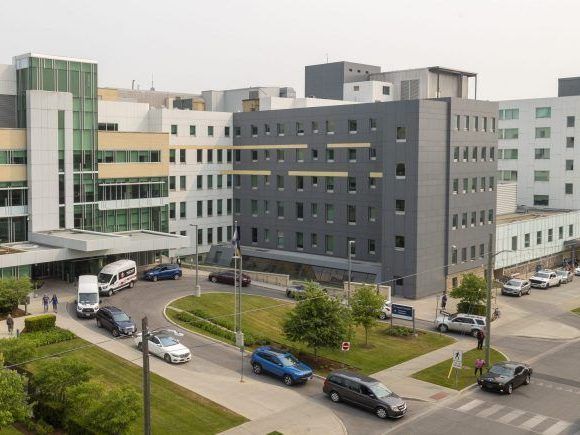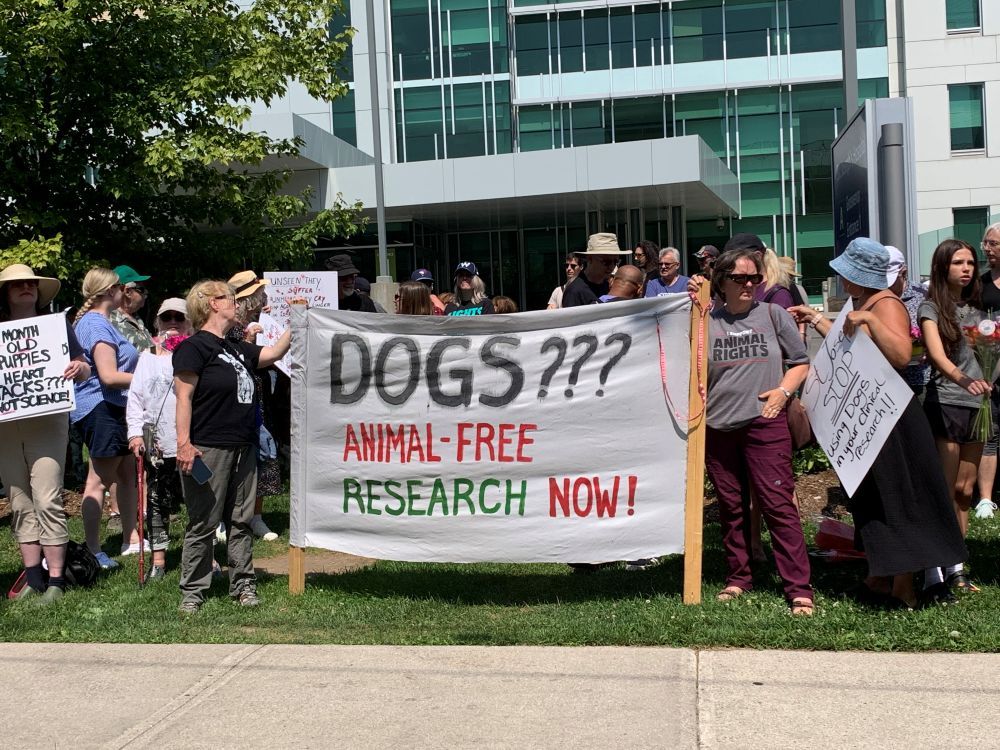
By Investigative Journalism Bureau
After decades of secretly inducing heart attacks in dogs as part of cardiac research, St. Joseph’s Hospital ended the practice on Monday in the aftermath of an Investigative Journalism Bureau (IJB) investigation.
In a public statement, the Lawson Research Institute at St. Joseph’s announced it will “immediately cease research studies involving dogs” following consultation with the province.
“We acknowledge that this will have a significant impact on the ground-breaking research that has resulted in major strides in cardiac care and treatment, and on the dedicated teams involved in this work,” the statement reads, adding “the government of Ontario is an important partner in every aspect of our work.”
The decision came five days after the IJB, in partnership with Postmedia, published a detailed investigation into a dog testing program shrouded in secrecy.
The story details clandestine experiments that force the animals into heart attacks lasting as long as three hours, according to internal study protocol documents reviewed by journalists and experts.

“I was deeply disturbed by last week’s reports of inhumane medical research taking place on dogs at St. Joseph’s Health Care London and immediately reached out to raise my concerns,” reads a post on X Monday afternoon from Ontario Premier Doug Ford.
“I’m pleased that St. Joseph’s has agreed to immediately stop this research. Our government will always act to ensure that any medical research is carried out in an ethical and humane manner.”
In an interview, Ford called the research “inhumane.”
“That’s stepping over the line,” said Ford, who has a family dog at home and another six among his immediate family.
“It can’t happen here in Ontario and it won’t happen. If I find any other universities or hospitals or research facilities doing that, I’m going to put an end to it immediately…We have to outlaw that in Ontario.”
Based on interviews with two whistleblowers as well as internal documents, images and video, the story details the surreptitious movement of dogs from a U.S. breeder into the hospital’s receiving doors in covered cages and up to what some staff call the “secret sixth floor.”
After the procedures, the dogs’ hearts are analyzed using the same MRI and PET scanning machines used on human patients one floor below.
The puppies are eventually euthanized and their hearts removed for further study. After the dogs are killed, the whistleblowers say the carcasses are placed in garbage bags and placed inside barrels for removal.
One of the whistleblowers told reporters Monday that the sudden shuttering of the dog program at St. Joseph’s comes as a relief.
“This is unbelievable. We need to keep this momentum up until these dogs are released and we see actual results.”
The staff member says eight dogs are currently being held in the hospital.
“Some of them are completely healthy. They haven’t even had their heart attack yet. But even the ones that’ve had heart attacks deserve a long life. One dog was supposed to be euthanized in a couple of weeks, so this came at the perfect time.”
Staff are told to refrain from discussing any of the work at the lab with colleagues or patients, according to an internal email and the accounts of the whistleblowers. Staff are also told to blast loud music to mask the sound of barking from others in the hospital and to refrain from throwing away dog food bags that could be spotted by staff.
In photos and video from inside the lab, dogs can be seen in cages — in some cases with feces — with no beds. One video shows a dog lying still and whimpering in high-pitched whistles following a procedure.

On Saturday afternoon, more than 100 people attended a vigil outside St. Joseph’s Hospital to commemorate the dogs used in the research and protest the testing.
The publicly-funded research is approved and “adheres to the highest standards of, and is in compliance with, all scientific and ethics protocols,” reads the hospital’s public statement.
Research involving animals is often a “necessary step before translating innovative therapies and diagnostic tests into clinical practice that improves human health,” according to a hospital statement Friday in response to the story.
The statement says the research requires dogs because “other effective models don’t yet exist for this specific line of inquiry.”
But there remains vigorous debate among researchers over whether the research requires the sacrifice of dogs.
Nicholas Dodman, a professor emeritus at Tufts Veterinary School in Boston and president of the Center for Canine Behavior Studies, calls the St. Joseph’s research “totally unacceptable.”
“Most people understand that when the blood supply to an organ is shut off in the case of a heart attack, it’s excruciatingly painful. Dogs don’t get that kind of heart attack; they don’t suffer from heart attacks like humans.”
Dodman says it is clear researchers tried to keep the work “under wraps.”
“Only now that it has become public, do they decide to stop these heinous experiments.”
Dr. John Pippin, a cardiovascular surgeon who advocates for animal-free research as the director of academic affairs at the Physicians Committee for Responsible Medicine, told reporters, “dogs are not 50-pound humans…They have distinctly different anatomy. They have different genetic characteristics that do not translate to humans. You can’t do anything to make them transferable to human medicine.”
Advocates celebrated the end of the program Monday.
“Ending St. Joseph’s cruel and outdated dog research program is a major victory for the innocent dogs who were forced to endure invasive, painful experiments and death behind closed doors,” said Camille Labchuk, lawyer and executive director of Animal Justice.
Animal Justice is now calling on St. Joseph’s to rehome the dogs.
In a statement to multiple media outlets after the publication of the IJB investigation, St. Joseph’s said, “the story contains several inaccuracies of fact, which we will be addressing separately with the media outlet.”
The IJB has not received any communication from the hospital about inaccuracies.
The Investigative Journalism Bureau (IJB) at the University of Toronto’s Dalla Lana School of Public Health is a collaborative investigative newsroom supported by Postmedia that partners with academics, researchers and journalists while training the next generation of investigative reporters.